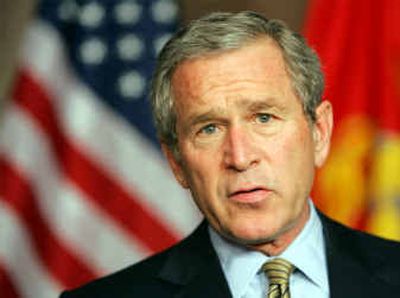Bush has few regrets – choice of words is one

WASHINGTON – In a rare, reflective look back on his first term, President Bush said Thursday that he learned a lesson about “the unintended consequences of my words,” recalling two famous expressions: “bring ‘em on” and getting Osama bin Laden “dead or alive.”
After he made the bin Laden remark at the Pentagon six days after the Sept. 11, 2001, attacks, Bush said: “I got back to the White House, and Laura said, ‘What did you say that for?’ Well, it was just an expression that came out. I didn’t rehearse it.”
Bush said his “bring ‘em on” comment, directed at Iraqi insurgents who were attacking U.S. forces in July 2003, was meant “to rally the troops … some interpreted it to be defiance in the face of danger, but that certainly wasn’t the case.”
Bush’s comments came during a wide-ranging White House interview with 15 reporters one week before his inauguration for a second term.
When Bush was asked about his biggest regret during his first term and his greatest hope for his second, he said peace was his most fervent hope, citing Iraq and the Middle East. But he deflected the first part of the question.
“I’m not a regretful person,” he said. “I’m a look-forward, get-things-done type of person.”
At the end of the interview, Bush was asked again about any regrets.
“One of the things I’ve learned is that sometimes words have consequences you don’t intend to mean,” he responded, leaning back in his chair in the Roosevelt Room. “The classic example was ‘bring ‘em on.’ “
Some former military leaders had criticized the president’s remark, saying it might goad Iraqis and put troops at risk. Bush’s opponents often used the “dead or alive” comment against him, pointing out that bin Laden was still on the loose.
“I don’t know if it’s a regret, but certainly a lesson, to be mindful of what you say, to be mindful of the consequences of your words,” he said. “What would you call that? Confession? Regret? A something.”
Asked about many issues, Bush was most animated in defending his campaign to overhaul Social Security by allowing younger workers to set up private investment accounts using part of their payroll taxes.
“I’m only going to be here four more years,” Bush said. “You can mark time or take the responsibility for making life better for the next generation.”
He pledged to lay out a detailed plan in coming weeks for Social Security changes, with ways to pay for the transition costs.
Bush was upbeat and relaxed through much of the interview as he discussed an ambitious second-term agenda, but he didn’t expand much on comments he’s made before.
He called for making tax cuts permanent, limiting medical malpractice awards, and revamping immigration laws to help some undocumented aliens stay and work in the country.
“They would have a legal means to go back and forth (to their home country) and not sneak back and forth,” said Bush, adding that the changes would help the Border Patrol deal with the real threat of smugglers and terrorists.
Bush defended his policy on the treatment and interrogation of prisoners in the war on terrorism, saying he was “concerned” about reports of abuses “that will be investigated.” He said he was “adamant” in opposing any use of torture.
But he didn’t say if he agreed with his White House counsel, Alberto Gonzales, who said at his congressional hearing last week to become attorney general that the president, as commander in chief, had the wartime power to override laws and order harsh interrogation, possibly even torture, in the name of national security.
“I’ll have to talk to Al about that and make sure where he’s coming from,” Bush said.
Asked if he’d ever authorized the transfer or “rendition” of prisoners to countries that practice torture, Bush said he wouldn’t answer: “This administration will not talk about intelligence-gathering matters.”
On another issue, Bush said it was wrong for the Department of Education to pay conservative commentator Armstrong Williams $240,000 to promote the No Child Left Behind program.
“That was a mistake. We’ll have to make sure that doesn’t happen again,” he said.